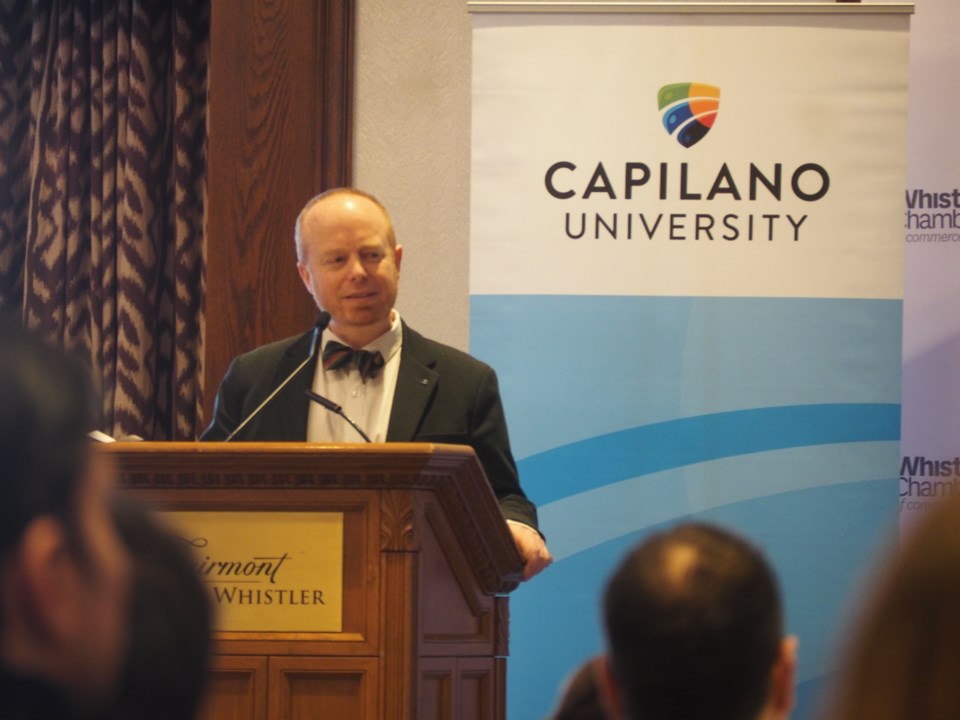Whistler isn’t losing its soul to change, but is growing as a community, says Mayor Jack Crompton.
Speaking at the second annual "State of the Municipality" event organized by the Whistler Chamber of Commerce last week at the Fairmont Chateau, Crompton took a few swings at the idea Whistler is losing its appeal to locals or longtime visitors over time.
“I get lots [of emails] like this,” he said, reading at length from one in particular from a few years back from a longtime visitor who took issue with traffic, pedestrians, and the menu options at Earl’s.
“There’s a couple as good as this, but this one I hold close because it’s so amazing,” he said to laughs.
“But, that message is one that we hear about our lost soul. We talk about it—though usually the concern is more substantive than running out of steak—but it's a conversation all the same. You may have thought it, you may have said it.”
Crompton posited what visitors and locals think of as "soul" in a place is what made them fall in love with it to begin with, and what they invested into that community, so change that came after them would be thought of as a departure—an idea he rejected.
“Dwelling in this nostalgia is not helpful, because it only looks at what Whistler is not," he said. "There are great things happening today, there is newness, there are exciting things happening, there is soul being built right now, and you are doing it.”
He then read off a shopping list of things happening in and around Whistler, touching on construction, education, investment and events.
“It seems to me that nostalgia and complaint freeze progress for us—I don’t think that’s helpful,” he said.
Crompton talked up the Resort Municipality of Whistler’s (RMOW) various priorities in housing, climate action, community engagement and smart tourism, which he said were all designed to ensure the RMOW doesn't get in the way of progress.
On housing, he talked about the RMOW building department increasing by 50 per cent to meet demand, opportunities to come through the Northlands development, and Whistler’s partnering with the recently-announced BC Builds program from the provincial government. “That’s money coming to town,” he said.
The climate action file also saw some movement recently, with a new wildfire defence plan and efforts by the municipality to increase public transport hours by 7,500 through the province.
“If they join us on that it will be the single biggest growth of transit in Whistler’s history in over 15 years—that will be a very big deal,” Crompton said.
However, the mayor cited a recent report to council on the RMOW's Big Moves policy, and said more had to be done.
“The elephant in the room is that we are missing our climate targets," he said. "I want you to know that this community needs to do better, that the RMOW needs to do better, that we all need to up our game because we are missing our targets.”
He also spoke about increased public engagement, and the need to lean into "smart tourism"—one of the RMOW’s priorities—an acknowledgement of the need to balance the interests of the sector against those who live here and may become disillusioned (or perhaps accuse the place of losing its soul) if the balance is out.
Crompton finished his address with an appeal to the audience on what they can do to help improve Whistler as a community, listing off a few suggestions starting with encouraging everyone with a basement suite to rent it out, and suggesting locals consider different commuting options.
“Start commuting differently, start talking to your teams about commuting differently—different times, different modes, different schedules for our workforce so when they come into town they’re not adding to the problems on the highway,” he said.
He acknowledged he was "preaching to the choir" given the audience in the room, but hopes the business community will keep stepping up.
“The state of our municipality is full of soul, it’s full of change, and there is a huge amount of work to do," Crompton said. "So let’s embrace it.”




